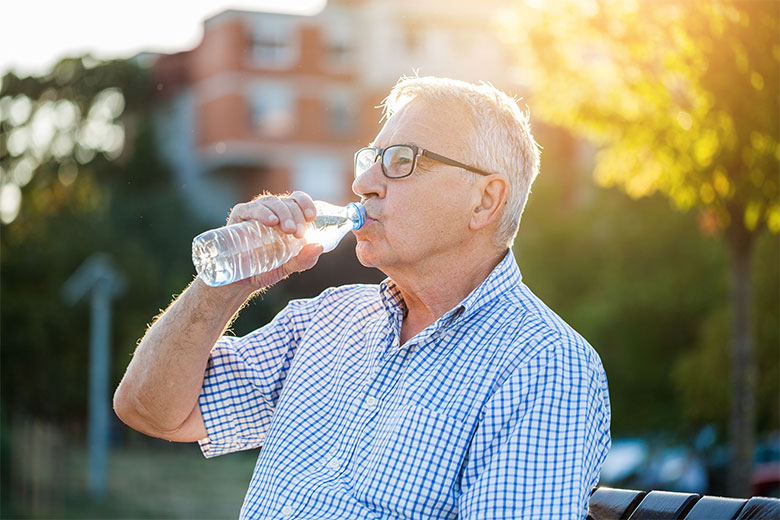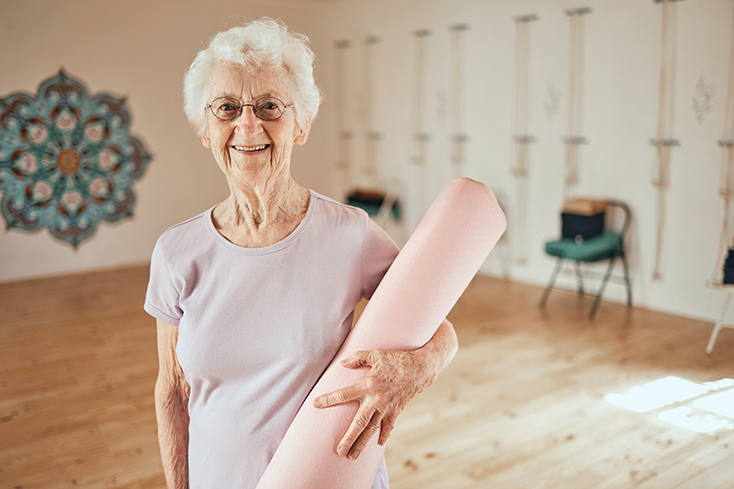
4 Best Ways To Stay Hydrated for Seniors
Simple, Practical Ways for Seniors To Drink More Water
Remember when you could go for hours without thinking about water? Maybe you'd grab a drink only when you were genuinely thirsty, and that worked just fine. But as we age, our bodies become less reliable at sending those "hey, I need water" signals. What used to be automatic now requires a bit more intention.
The challenge is that many older adults simply don't feel thirsty as often as they should — and certain medications can make the situation even more tricky.
Here's the encouraging news: staying properly hydrated doesn't require a complete lifestyle overhaul. With a few thoughtful adjustments to your daily routine, you can feel more energized, think more clearly, and avoid those preventable trips to the doctor.
1. Make Water Part of Your Daily Rhythm
Here's something most people don't realize: as we get older, our internal "thirst alarm" gets quieter. You might not feel thirsty until you're already running low on fluids. It's not your imagination — it's just how our bodies change over time.
Add medications like diuretics, blood pressure pills, or laxatives into the mix, and your body might be losing fluids faster than that quiet thirst signal can keep up with.
Creating Habits That Stick
Instead of playing the guessing game with thirst, try to include drinking water in the activities you already do:
- Every time you sit down to eat — whether it's breakfast, lunch, dinner, or that afternoon snack — have a glass of water waiting. It becomes as automatic as using a napkin.
- Keep a water bottle or glass somewhere you'll actually see it. Next to your favorite reading chair, on the kitchen counter, or on your bedside table. Out of sight really can mean out of mind.
- If you're comfortable with phone apps or simple alarms, set gentle reminders throughout the day. Even a sticky note on the bathroom mirror works wonders.
- This might sound small, but it is important. Pick something lightweight that feels comfortable in your hands. If arthritis makes gripping difficult, look for cups with larger handles or non-slip grips.
2. Let Your Food Do Some of the Work
Not all hydration has to come from a glass. Many foods naturally contain impressive amounts of water, which means every bite contributes to your daily fluid needs.
Think of these as ways of making hydration delicious:
- Watermelon (it's in the name, after all)
- Strawberries and other berries
- Cucumbers (perfect in salads or as snacks)
- Tomatoes (whether fresh or in sauces)
- Oranges and citrus fruits
- Zucchini (surprisingly water-rich)
- Lettuce and leafy greens
- Applesauce
- Soups and broths
- Smoothies (an excellent way to combine hydration with nutrition)
3. Make Plain Water More Appealing
Let's be honest — not everyone loves plain water. If you find yourself avoiding it because it tastes bland or uninteresting, you're definitely not alone. The solution is simpler than you might think:
- Add natural flavor. Drop a few slices of lemon, cucumber, or berries into your water. Fresh mint leaves work beautifully, too. Suddenly, hydration becomes something to look forward to.
- Explore tea options. Herbal teas count toward your fluid intake and come in countless flavors. Serve them hot in winter, iced in summer. Chamomile, peppermint, and ginger teas are particularly soothing.
- Consider low-sugar alternatives. Electrolyte drinks designed for older adults can be helpful, especially if you're more active or take medications that affect fluid balance.
- Dilute fruit juices. Mix your favorite juice with water or sparkling water. You get the flavor you enjoy with less sugar and more hydration.
Some beverages can work against your hydration goals:
- Large amounts of regular coffee (though your morning cup is perfectly fine)
- Alcoholic drinks (they can increase fluid loss)
- Very sugary sodas (they don't hydrate as effectively)
The key word here is balance. You don't need to give up your morning coffee or the occasional glass of wine — just make sure you're drinking extra water to compensate.
4. Adapt Your Approach to Your Needs
Life sometimes throws us curveballs that make staying hydrated more complicated. If memory issues make it easy to forget to drink, or if getting around has become more difficult, small adjustments can make a big difference:
- Use visual cues. Clear glasses or bottles with measurement marks help you see how much you've had. Some people find it motivating to see their progress throughout the day.
- Strategic placement. Put water wherever you spend the most time. If you love your living room recliner, keep a bottle there. If you spend mornings at the kitchen table, make that your hydration station.
- Ask for support. There's no shame in letting family members or caregivers know you'd appreciate gentle reminders. Sometimes we all need a little help maintaining healthy habits.
Health Conditions Require Individual Approaches
If you're managing kidney issues, diabetes, heart conditions, or other health concerns, your hydration needs might differ from general recommendations. This isn't something to figure out on your own — your doctor or a registered dietitian can provide guidance that's specifically tailored to your situation.
The goal is finding the right balance for your body and circumstances.
Benefits of Hydration in Older Adults
Proper hydration affects virtually every system in your body, but the benefits are especially noticeable as we age.Physical Benefits You'll Actually Feel
- Better digestion and less constipation (nobody wants to talk about it, but everyone appreciates when things work smoothly)
- Improved circulation and better temperature regulation
- Fewer urinary tract infections and reduced risk of kidney stones
- More comfortable joints and healthier-looking skin
Mental and Emotional Benefits
- Clearer thinking and better memory
- Less fatigue and irritability
- Reduced dizziness or confusion
When you're properly hydrated, you simply feel more like yourself. Staying hydrated as we age requires a bit more intention than it used to, but it doesn't have to be complicated or stressful. Small changes — drinking water with meals, choosing hydrating foods, finding flavors you enjoy, and adapting to your personal needs — can make a meaningful difference in how you feel every day.
Why Seniors in Beverly, MA Trust Herrick House
For residents in Beverly, The Herrick House offers daily support that includes hydration assistance as part of a well-rounded lifestyle. As a locally trusted, not-for-profit senior living community owned by Beth Israel Lahey Health, we provide a comfortable setting where residents receive care that respects their independence and routines.
Our experienced team helps residents stay on track with nutrition, hydration, and wellness — without pressure. With a strong focus on dignity, inclusivity, and connection, we welcome you to learn more about what makes life at Herrick House so supportive and engaging.
Contact us today to schedule a tour or speak with someone about how we can support your family's needs. Whether you're planning ahead or seeking guidance, we're here to help you feel at home.
Disclaimer: This article is for informational purposes only and does not constitute medical, legal, or financial advice. It's recommended to consult with a medical, legal, or financial professional for your specific circumstances.




